"Pop culture was in art now art's in pop culture in me."
Don't wanna be here? Send us removal request.
Text
Perfume Poems: Kerbside Violet by Lush Cosmetics

Crisp: like laying in fresh cut grass, like violets, like breaking their stems and inhaling the sharp green sap, like learning the word “vegetal,” like oversteeped black tea, like a bath with midnight water and far too many bubbles, like a crystal glass of gin and one of those fancy ice cubes with a flower frozen inside somehow.
Notes: violet leaf, ylang ylang, jasmine
2 notes
·
View notes
Text
Hunger Makes Me a Modern Girl: Carrie Brownstein on What It Means to Be Satiated
"Hunger" is an apt metaphor throughout the life of Carrie Brownstein—founding member of Sleater-Kinney, guitarist, singer, writer, and creator and co-lead of Portlandia.
On paper, her memoir Hunger Makes Me a Modern Girl is about Brownstein's rise to fame in one of the most celebrated rock bands to come out of Washington's indie music scene in the 1990's. But, beneath the music history, the book poses a more universal question: What does it mean to be truly fulfilled in life?
Her success story is punctured by a sense of lack, of want and of need—of hunger. Growing up witnessing her mother's struggle with anorexia, Brownstein understood hunger from a young age, spending many hours in eating disorder treatment centers visiting with women who used food as a tool to gain some sort of control.
The same pressures that afflicted these women followed Carrie throughout her career in music. As the band grew in popularity, she quickly began to feel burdened by the weight of public scrutiny: the pressure to appease everyone, to justly represent the values of an entire community back home, to work herself to the bone, to book back to back tours, to be an exemplar "woman in music," to speak on the state of the music world even more often than she was able to participate in it. While touring, her dissatisfaction became unbearable, a physical weight on her shoulders in the form of a heavy guitar, inflicting chronic pain and pulling her into a severe depression. She had everything she thought she wanted, but the pain became excruciating, and in 2006, Brownstein left the band on a long-term hiatus.
If your entire life is centered around just one thing, and that comes to an end, what are you left with? Carrie tried to answer the question by throwing herself into another passion: her love for animals. She found herself anew in the animal shelter where she volunteered an obscene amount of hours for one year; she carved out a new role in life—caretaker—and found joy in the love of her four pets. But this too, tragically, crashed down around her after a horrific accident and the loss of her two cats.
What's clear from Carrie Brownstein's story is her realization that identity can never be centered around just one thing. People, herself included, are multifaceted, their needs ever-changing. In Hunger Makes Me a Modern Girl, Carrie admits she avoided change by trying to force herself into preordained roles—the thought of looking inwards and asking "Is this life purposeful?" carried too much potential for destruction.
Hunger doesn't have to result in suffering nor in lack—It can push you to search for more. And by the end of her memoir, Carrie Brownstein says she finally felt freed to explore the full range of her artistic capabilities. She went on to launch a career writing reviews and interviewing musicians, created a tv show that poked fun at Portland's eccentric communities, and realized she had a crazy talent for writing satire and comedy. And eventually, she even found her way back to Sleater-Kinney with a restored love for music, and in 2015, the band released its first album in a decade, No Cities to Love.
Hunger Makes Me a Modern Girl reminds that hunger is a natural instinct, your body's warning signal when it needs more. And much like the lesson of the Sleater-Kinney song the memoir borrows its name from, the only way through the mess of public scrutiny and societal pressure is to look within for happiness instead of outwards.
6 notes
·
View notes
Audio
This week, a racism controversy made international news after Bachelor host Chris Harrison defended a contestant’s racist...
#The Bachelor#bachelor#bachelorette#the bachelorette#reality tv#podcast#abc#union#unionization#entertainment#essay
0 notes
Text
One Nation Under God: How President Biden and The Bachelor Franchise Use Christianity As An Unassailable Defense Against Divisiveness

“I’m going to pray for everybody.”
Since Day 1, The Bachelor has always been a reflection of American values. But who could have expected that in 2021, just days apart, the inaugural speeches of America’s first Black Bachelor and President Joe Biden would be so similar, they practically followed the same sermon?
Matt James, the first Black man to lead The Bachelor in its 20 year run, had much stacked against him when he “entered office.” He was a person of color navigating a show with a very white, often incredibly conservative audience. James followed Rachel Lindsay Abasolo, the first Black Bachelorette, whose 2017 season was met with record low ratings—a harrowing survey of Bachelor Nation which Mike Fleiss, creator and producer of the show, commented on in a NYT article, saying, “I found it incredibly disturbing in a Trumpish kind of way. It revealed something about our fans.” And in the three years since Rachel’s season, racism in the country has been pushed even further towards the surface; James took the helm amidst a resurgent wave of Black Lives Matter protests, racial inequity exasperated by the COVID-19 pandemic, and calls to defund a criminal justice system whose governance is inherently racist—each of which was met with equally loud conservative protest. Matt James’s season practically invited criticism from detractors: That he’s here for the wrong reasons, is undeserving of the (traditionally white) title, or was cast to placate increasing demands to diversify the show’s cast rather than for his merit.
Facing an incredibly traditionalist racist sect of Bachelor Nation, James began his opening speech: “I’ve had so long to think about what I’m going to say to you all, but I’m going to take a different approach. If everybody could just bow their head really quick, I’m going to pray for everybody.” James framed his introduction with the one thing a conservative audience can’t argue with: Christianity. His entire image on the show is centered around his faith—his belief that love is “a blessing,” that he’s “been called” to find his wife, and his confession that each decision he makes is based on his religious code of ethics.

His faith in God, and by extension, his faith in the show’s process as God’s plan, protects him and the franchise from criticism over political or ideological differences. Frankly, being Christian is very “here for the right reasons.” Because he’s a godly man, anything else can be understood (Throwback to Hannah B’s infamous line: “I’ve had sex, and honestly, Jesus still loves me.”) It’s an MO that resists criticism—You cannot question a person’s character if their decisions, in James’s own words, are inspired by God. Worshipping the same god levels the playing field; two people are one and the same standing before their Lord.
Framing Matt James’s season in Christianity was vitally important for the show to maintain its conservative Christian audience. With this one prayer, and the many to follow, the show effectively fulfilled its two opposing demographics—one that would, under any other circumstance, reject a Black Bachelor, and the other which threatened to stop watching if the show made no effort to diversify or progress. This isn’t to doubt Matt James’s faith, he is clearly a religious man, but the degree to which The Bachelor producers highlighted his Christianity was undoubtedly damage control.
Herein lies the identical strategy used throughout President Joe Biden’s speech at his inauguration on January 20th: Christianity as an unassailable call for unity.
Of course, President Biden faced the same divisive nation when he took office, on an even larger scale. His opposition was loud and numerous (I know few who actually favored him as anything more than an alternative to the last administration, but that’s a conversation for another day). “Sleepy Joe” was fervently and vocally hated throughout his campaign, and especially in the months leading up to his swearing-in ceremony. Just days before his inauguration, domestic terrorists stormed the Capitol in an act of political extremism opposing a peaceful transfer of power. This group, and those around the country who share their beliefs, are white supremacists who villainize the Black Lives Matter movement and the fights for economic and racial equity. Now-president Biden was called to speak to a divided, suffering nation in the heat of battles over innumerable causes: the origin of COVID-19 and the resulting xenophobia, the prior administration’s response to the pandemic, mass unemployment, the need for financial stimulus, the role of our criminal justice system, the (in)efficacy of a government that underprioritizes social programs—the list goes on.
President Biden’s inauguration was framed by fears of another insurgence, increased police presence throughout DC and other major cities, and national uncertainty apart from the consensus that the fight is not over and more conflict is sure to come. Strategically, in response, he delivered a speech that carefully aligned national unity and peace with Christian beliefs.
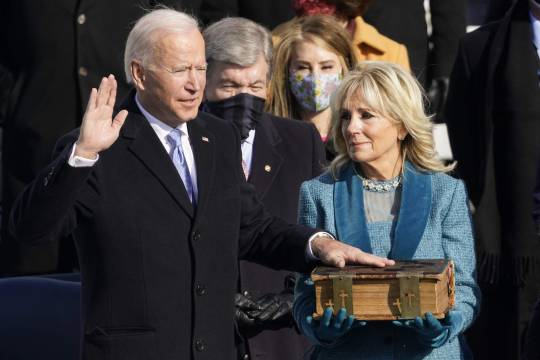
His sermon urging Americans to come together was packed with references to Christianity: “History, faith, and reason show the way of unity,” “From now on, on this hallowed ground, where just days ago violence sought to shake the Capitol’s very foundation, we come together as one nation under God,” Let us add our own work and prayers to the unfolding story of our great nation. If we do this, then when our days are through, our children and our children’s children will say to us, ‘They gave their best, they did their duty, they healed a broken land,’” and “I promise you this—As The Bible says, weeping may endure for a night but joy cometh in the morning. We will get through this together.”
The president’s heavy handed implication is that if Americans come together united by religious values, they may still disagree politically, but morally they must grant eachother mutual respect. And if the nation at least shares a faith and a belief system, the rest can be worked out.
With that, Biden punctuated his speech with the same sentiment that began Matt James’s: “We’ve been through so much in this nation, and as my first act as President, I’d like to ask you to join me in a moment of silent prayer.”
The Christian unity gameplay—and that’s what it is, a defensive play leaders can pick from their playbook, as strategic and well-thought-out as a quarterback at the Super Bowl—deflects criticism and forces togetherness in a way that only religion can achieve. This isn’t to say that President Biden fixed bipartisan division overnight, or that there are no more intolerant, racist Bachelor fans, but it’s clear the two both recognized the Christian gameplay was their best shot at a win.
#bachelor#the bachelor#abc#reality tv#biden#president biden#inauguration#politics#religion#Matt James#christianity
3 notes
·
View notes
Text
Meet Moral Crema: A Fluid Collective for Weirdo Artist-Visionaries
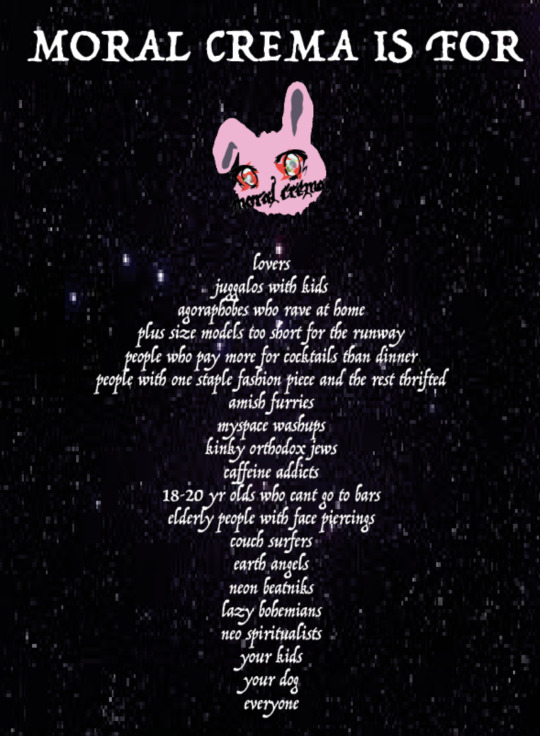
The Art World™️’s inherent lack is more obvious than ever. Institutions house bored classics in empty halls; sanitized paintings and sculptures sit unviewed, accessible to only the privileged with enough funds and free time to freely folic during a pandemic. Now more than ever, it’s the alternative and underground creators that rise above, not just filling in the gaps left by the megarich, but setting a new standard entirely.
Moral Crema—a fluid collective of artists loosely based in Boston—is all these institutions leave longing: A breath of fresh air. Or, a burst of smoke, a glittering dark cloud, the sun setting to reveal the wonders of the night. Moral Crema’s kinda gothy, sometimes nasty, always visceral—Weird shit, in the best way.
The collective was founded in December 2019 by Luc Miglin (@sparklingspit) and Kristine Brown (@bigtractorguy), interdisciplinary conceptual artists who met while studying at MassArt. The two were inspired to highlight “grimy, unconventional, ever-changing” work outside the norm. “We want to share work that is overlooked,” they say, “We want to create the kind of community that we want to be a part of that we do not see in the art or culture worlds right now.”
And that they did. The platform they’ve created is indefinable, uncategorizable, connected by a shared sensibility and way of seeing the world—One that evokes a sense of decadence and hedonism (crema) but also a philosophical skepticism (moral dilemma). The artists of Moral Crema venture, question, and experiment: in dark glamour, in drag, in performance, in house music, grunge, and hyper-digital beats, in photography, poetry, and illustration.
For the most immersive Moral Crema experience, head over to the collective’s Bandcamp and pick one of the artist-members’ albums to stream before diving into the magazine: I recommend Le Snake’s *we made this in an hour and a half: a chaotically distorted and hilariously poignant portrait of pop culture, filled with gems like WE HATE HULU AND LOVE ISLAND (“I’ve never watched that show”) and I STOLE THIS SAMPLE. Or Boston-based DJ Froglycerine’s dark erotic electronica album Bog Bitch, whose samples feel eerily familiar, like some line from a coming of age movie you can’t place or a viral video, twisted into a new uncanny mix.

Moral Crema’s quarterly magazine, inspired by cabaret literary journals, is the collective’s real piece de resistance. In the October 2020 issue, perhaps most curious are Gaby Schaab’s Xerox scans documenting food as cultural artifacts: a Salvation Mountain-lookalike birthday cake made by a friend, potluck leftovers, remnants of an easter dinner. “Food is often the catalyst for idea transmission,” she writes, “What brings us to the table.” Her images are both preservative and transformative: Food taken from its original context, no longer able to be eaten, instead becoming everlasting symbols of community, culture, and care frozen in time.

On the other end of the spectrum, designer, drag performer, and DJ Soo Intoit bursts with energy and life: Stunning in every sense of the word. Whether through her experimental makeup, outfit, or set, Soo Intoit embodies the disciplinary mindset of Moral Crema: She is her art, her body the medium. “It’s so important that I listen to music while I get ready,” she explains, “I feel like I am becoming the music as I change my appearance. The songs make me look the way I do, and then it’s almost like they play themselves.” Influenced by everything from cybergoth and centipedes to McQueen and Mugler, Soo Intoit effortlessly blends the most unsettling and inspiring aspects of pop and high culture, creating a new aesthetic so multifarious it can’t even be explained, just felt.

With her liberated dark glamour burlesque, Fermelda Hyde (aka Abby Holgerson, @ominousabby) simultaneously appropriates and critiques the aesthetics of the rich and hedonistic. Drawing inspiration from 18th century vampire fashion, she often dons lace collars and powdered wigs, embodying Marie Antoinette or a gothic nun. In to perform, her video collaboration with Luc featured on Moral Crema’s website for Halloween, Fermelda Hyde applies bloodied makeup and dances to a soundtrack of samples stating “I like to feel good, especially when I pretend I’m someone else” and “I’m going to live forever”—a provocative and somewhat horrifying commentary on the performance and (im?)permanence of the projected internet persona.
It’s hard to imagine what Moral Crema can’t, or won’t, do next. In addition to the magazine and Bandcamp, Luc and Kristine also plan to host digital and in-person events in the future (Rumor has it a socio-political parody of a maid cafe is in the works).
To stay up to date on Moral Crema’s manifold projects, check out moralcrema.com and @moralcrema on Instagram!
#moral crema#moralcrema#luc miglin#sparklingspit#bigtractorguy#Gaby Schaab#Fermelda Hyde#Ominous Abby#Soo Intoit#Le Snake#FroglyCerine#electronic music#electronica#drag#performance#burlesque#boston#boston diy#diy#underground#underground artist#kristine brown
21 notes
·
View notes
Text
American Horror Story: Hotel, The Playlist

So I finally watched American Horror Story: Hotel. As a huge fan of Lady Gaga, horror, and socio-political symbolism hidden amidst decadent and extravagant performances, I know I probably should’ve watched this series a long time ago. But, alas.
Despite its so-so reviews, I found AHS: Hotel to be a striking portrait of desire and greed, of cruelty necessitated by an insatiable thirst for sex, wealth, power, and control. Hedonistic characters John and The Countess prey on the blood of the vulnerable to sustain their lifestyles, forcing those around them into an unbreakable parasitic bond: Question those in charge, and there shall be hell to pay. These two are a metaphor for the elite—the rich, the powerful, the bosses—who commit atrocities under the guise of an aspirational lifestyle. Those in proximity to the deluded and narcissistic are forced to form unique bonds with eachother if they dare survive in this dog eat dog world, else they’ll fall victim too.
Power is fetishized in AHS: Hotel—one of the most bodily, visceral series I’ve ever seen. I found myself watching with one eye closed, wondering, should I be turned on by this or horrified? (The answer is Both).
I wanted to create a playlist with this same feeling: Of aspiration and awe, of admiration for the lifestyles of the rich and powerful, but also the horror experienced when realizing the human toll left in their wake. The following playlist is a mix of celebratory dance pop with a dark edge, outright begs and screams for help, and admittedly, a lot of Gaga. Think of it as the soundtrack to the Hotel Cortez.

American Horror Story: Hotel, The Playlist
Michelle Gurevich - Dance While You Can
Beyoncé - Haunted
Chloe x Halle - Tipsy
The Blow - Pardon Me
Sharkmuffin - Liz Taylor
The Blow - Eat Your Heart Up
Lady Gaga - Beautiful, Dirty, Rich
Miley Cyrus, Big Sean - Love Money Party
Lady Gaga - Boys Boys Boys
Countess Coloratura - The Spectacle
Lady Gaga - I Like It Rough
She Wants Revenge - Tear You Apart
Lady Gaga - MANiCURE
No Doubt - Trapped In A Box
Paralysed Age - Bloodsucker
Kittie - Cut Throat
Venom - Countess Bathory
Pop Smoke - Hotel Lobby
Queen - Killer Queen
Berlin - Pleasure Victim
Solange - Where Do We Go
Tove Lo - Habits (Stay High)
Lykke Li - Sex Money Feelings Die
Deux - Decadence
Sabrina Claudio - Everlasting Love
Labrinth - Forever
#playlist#lady gaga#american horror story#AHS#ahs hotel#hotel#ameriacn horror story#sarah paulson#evan peters#review#tove lo#lykke li#no doubt#the blow#miley cyrus#chloe x halle#beyonce
43 notes
·
View notes
Text
"I got this COVID test for you, baby!”
Coronavirus Testing as a Sign of Devotion in The Bachelor Franchise

The Bachelor can really twist anything into a symbol of commitment, can’t they?
The most recent performative exhibition of loyalty: Mandatory COVID-19 tests. Throughout episode 1 of Clare’s season, we watch contestants enter a brief quarantine where they’re tested three times for the virus. No biggie, right?
Wrong. These men whined and squirmed, coughing and vocalizing in pain. As someone who’s gotten a few nose swabs myself, I can guarantee it’s...really not that bad.
But in the context of the show, the tests’ purpose was twofold: Firstly, to reassure viewers all necessary precautions were taken before filming. And more importantly, to prove to the audience each of these men must be “here for the right reasons.”
It’s a refrain we hear often: “I have children, and I wouldn’t leave them if I wasn’t here for the right reasons,” rinse and repeat. The Bachelor franchise clings closely to this idea of authenticity. It’s not a platform for wannabe-influencers, no! Those ill-intentioned contestants, few and far between, are just “here for the wrong reasons” and will quickly be exposed for their ulterior motives.
But in Clare’s season, pure intention is baked in. Who would put their life on hold for months (far longer than usual, as filming was extended two or three times), quarantine by themselves for another week, and endure unbearably painful COVID tests if they weren’t truly after Clare’s heart?
The nose swabs are, symbolically, loyalty tests. It’s why we hear each man recite, “Isn’t it crazy what we do for love? Flew across the country, quarantining, just to make ourselves available and healthy for Clare,” or, “Quarantining and taking these crappy COVID tests—But I know it’s gonna be worth it for Clare.” (Scripted lines, no doubt.)
In other reality TV dating shows—Love Island, for example, which was the first to film during the pandemic—COVID is only mentioned in passing jokes, so as to not ruin the mood. But The Bachelor franchise, on the other hand, knows how to make the COVID test work in their favor, carefully framing pandemic dating as the ultimate display of affection.
The men believe it, too. Months of waiting have gotten to their heads. “She must be my soulmate, my future wife,” I imagine them thinking, “or else I wouldn’t put myself through this.” Producers, undoubtedly, have repeatedly assured them, “Clare is waiting for a man just like you.” I’d be prone to believe that, too, if given months to convince myself.
Just wait until the men find out that while they were dreaming of their fairytale princess, quarantined in a thoroughly-disinfected tower, Clare was already talking to her Prince Charming....
#Bachelor#Bachelorette#The Bachelor#The Bachelorette#Clare#Clare Crawley#Chris Harrison#COVID19#Coronavirus#Reality TV#pandemic dating#blog#blogs
7 notes
·
View notes
Text
Tabatha Coffey Wasn’t a Bitch, She Was Just a Lesbian
Why Lesbophobia Is To Blame For The Reality TV Star’s Stone-Cold Reputation

We’ve all seen the meme: The letters B I T C H spelled out vertically, each attributed to some meaningless characteristic (B = Bimbo, Blonde, Barb, I could go on).
The picture originated from a 2017 Ted Talk by Tabatha Coffey—celebrity hairstylist, winner of Shear Genius, and host of Bravo’s early-2010s reality TV show Tabatha Takes Over—who spoke of the relentless criticism she’s faced throughout her career. Tabatha intended to show that her negative image could actually be tied back to positive qualities: Brave, Intelligent, Tenacious, Creative, Honest. But quickly, the image became a parody of itself: A joke about how absurd it is for neoliberal feminists to care enough about the word “bitch” to try to reclaim it, or try to spin it to be anything but negative. I get it—There are bigger fish to fry, and in 2020, a white woman dissecting “bitch” feels a bit like grasping at marginalization straws.

But also...maybe Tabatha Coffey had a point?
In retrospect, it’s obvious Tabatha’s reputation as a bitch is rooted in lesbophobia. She’s written off as domineering and cold—negative qualities misattributed to lesbians. She doesn’t conform to what we think a woman “should be,” particularly in relation to men; rarely is she maternal, never compromising. Tabatha never makes herself small. Instead, she remains firm, career-oriented, confident, and self-assured.
It’s no coincidence that she’s usually called a bitch directly after setting a man straight (And, trust me, these are men that deserve to be put in their place). In S1E3 of Tabatha Takes Over, Tabatha is repeatedly patronized by Martino, the owner of Giovanni Pileggi Salon, who called her in to help save his failing business. Throughout the episode, Martino alternates between calling Tabatha “hon” and “a bitch,” as if he’s still trying to decide whether he wants to top her sexually or professionally. “If you call me hon one more time I’m going to whack you upside the head,” she finally snaps, “I’m not your hon, I’m not your sweetie, I’m not your baby, I’m not your darling.” She, fairly, sets up a boundary with men in the workplace—She’s here to help advise, not to be demeaned. But it’s this boundary that solidifies her image as a bitch. He retorts, “Most women aren’t like Tabatha: Stone-cold soldiers.”
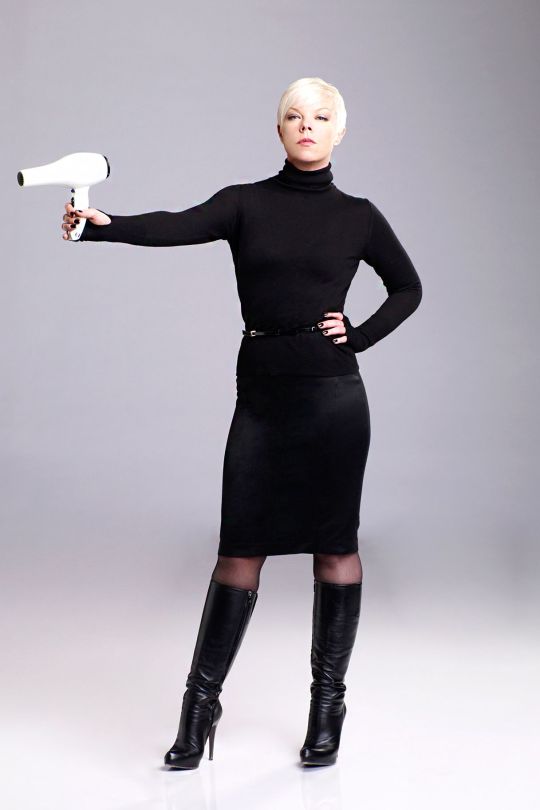
Now, I’m not going to deny the fact Tabatha is a particularly quippy host. She has some great one-liners—That is her job, after all. But sassy hosts make for good reality TV; it’s one of the medium’s earliest and most successful tropes. Many of her contemporaries, including Tyra Banks and Heidi Klum, are known for making offhanded biting critiques, too, and they’re never written off as cold-hearted bitches. You know who is treated like a bitch? Nina Garcia—LESBIAN. (Just kidding, I just wish she was. Nina, if you see this, I <3 you).
Despite her sometimes-harsh remarks, Tabatha is a fantastic host, a wonderful mentor, and a skilled stylist. She is obviously invested in helping people reach their highest potential: constantly giving positive encouragement, helping stylists get training, and suggesting promotions for employees who rise above. And in many situations, Tabatha exhibits extreme empathy and understanding—qualities she’s misdeemed incapable of. When one salon owner explains that her business fell to the wayside after her mother’s death, Tabatha comforts her. She says, “You have a lot going on. The things that you’re worrying about truly are life and death. It sounds like you left a little bit—Are you prepared to be present in your business again?” Tabatha is business-minded and motivated, but she doesn’t lack humanity, as many so accuse.
It’s easy to write off Tabatha’s “Call me a B.I.T.C.H.” mantra as deflective or sensitive (To be fair, this does give me “A bitch is a female dog, dogs bark, bark grows on trees” vibes). But I think she deserves far more credit than she’s given. Tabatha is an icon, a mogul, and she’s got amazing hair and even better outfits. If she came onto the scene now with the same attitude, she would be absolutely adored, not discarded.
So can 2020, a year of reconsideration and reflection, be the year Tabatha Coffey finally gets her flowers? She’s tough, she’s talented, and it’s time she takes over!!!
#bravo#reality tv#tabatha coffey#tabatha takes over#tabatha's salon takeover#shear madness#review#op ed#opinion#blog#blogs
15 notes
·
View notes
Text
Perfume Week Plus: Whispered Myths
Shortly after finishing my #PerfumeWeek project, which combined daily perfume reviews with accompanying themed playlists, Imaginary Authors sent me a few more perfumes to play around with! Here we go, #PerfumeWeekPlus!

Whispered Myths smells of your lover’s longtime favorite novel. You bury your nose deep in its spine, hoping to catch a whiff of them, as familiar notes of aftershave and cologne waft up through its aged pages.
Whispered Myths is a classic blend—One for the archives. Its woody base of Cambodian oud, cedarwood, and muskdana is lightened by hints of cantaloupe and honey, softening the strong elemental perfume. Whispered Myths smells wonderfully historic, nearly antique, as if the blend spent decades maturing in wooden barrels before bottling.
The cologne was inspired by the fictional tale of Azzam Issa, a security guard at The Louvre. Sleepless and disoriented, Azzam began to hear whispers throughout the museum: Gods, angels, mermaids and muses calling to him from inside the paintings, their souls trapped within ornate frames. Inhaling Whispered Myths will transport you to the museum archives with Azzam, standing amidst rows of wooden shelves, taking in the scent of oil paints and yellowing manuscripts.
Wear Whispered Myths, a cultivated and cultured perfume, when you want to embody greatness: The essence of great authors, great paintings, and of course, great fragrance.
Whispered Myths: The Playlist
Daniel Johnston - Museum Of Love
Lorde - The Louvre
Thomas Paul - A Footnote To History
Bobbie Gentry - I Saw An Angel Die
Fleetwood Mac - Everywhere
Talking Heads - The Book I Read
Elvis Costello & The Attractions - Everyday I Write The Book
Leroy Anderson, Alasdair Malloy - The Typewriter
#perfume week#perfumeweek#perfume week plus#perfumeweekplus#perfume#cologne#fragrance#Imaginary Authors#review#perfume review#Lorde#Bobbie Gentry#Fleetwood Mac#Talking Heads#blog#blogs#playlist
1 note
·
View note
Text
Perfume Week Plus: O, Unknown!
Shortly after finishing my #PerfumeWeek project, which combined daily perfume reviews with accompanying themed playlists, Imaginary Authors sent me a few more perfumes to play around with! Let’s go, #PerfumeWeekPlus!
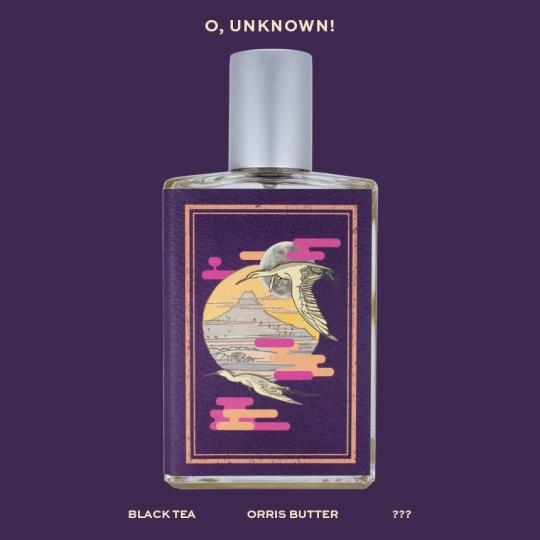
O, Unknown! is the first step to the most decadent routine. Douse yourself as you begin to get ready, before applying makeup or stepping into your clothes, to set the tone for your day or night—O, Unknown! will transform with you as the clock ticks.
Its first application smells distinctly of powder and cream lipstick, of cocoa butter and warm wax. The scent calls to mind low-lit dressing rooms, starlets sitting at vintage mirrored vanities littered with compacts and perfume bottles, coddled by silk robes and velvet bedding.
By the time you’re ready to leave the house, O, Unknown! matures; it’s a perfume that cleans up nicely. As it settles, melodramatic notes of black tea, lapsang souchong, and sandalwood emerge, transforming the powdery perfume into a sweet and smoky potion.
Wearing O, Unknown! feels luxurious, mysterious, like anything could happen (Fitting, as one of the ingredients Imaginary Authors lists for the perfume is simply noted “???”). Breathing in its scent makes you feel like a socialite, a somebody on the way to the opera, or perhaps a movie premiere—even when your day is as average as any other.
O, Unknown!: The Playlist
Jhene Aiko - Magic Hour
Teyana Taylor, Kehlani - Morning
Gloria Gaynor - Be Soft With Me Tonight
Phil Collins - In The Air Tonight
John Legend - Surefire
Jenevieve - Baby Powder
Cher - Take Me Home
Beyonce - Rocket
Smino, Akenya - Silk Pillows
#perfume#perfume week#perfumeweek#perfumeweekplus#imaginary authors#cologne#perfume review#jhene aiko#teyana taylor#kehlani#gloria gaynor#phil collins#john legend#jenevieve#cher#beyonce#smino#akenya#blog#blogs#playlist
3 notes
·
View notes
Text
All Alone With Something To Say Epidode 7: IKONS
This week, my friend Emma Newbery brought me onto her podcast All Alone With Something To Say to discuss all things Kardashian!
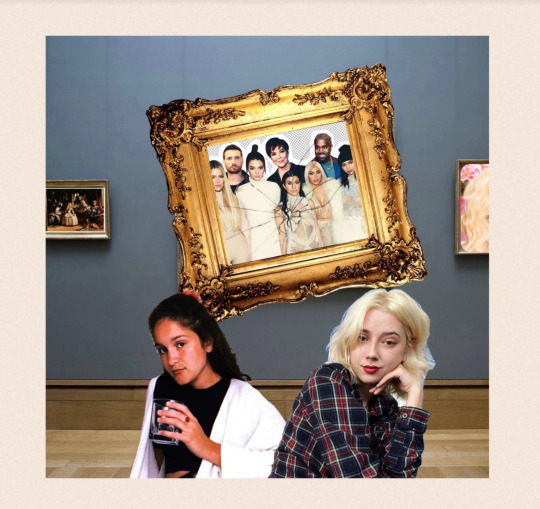
All Alone is a forum where people can look critically at the positive and negative impacts of the things they love. Emma’s invited guests to talk about everything from the moral grey area of thrift shopping to the implications of indulging in true crime podcasts.
I appreciated this culture of self-awareness and critically as we talked about the Kardashians, who I believe are both the most complicated and influential celebrities of our time. Today, the family’s reach extends far beyond the reality TV and entertainment industries, shaping fashion, beauty standards, the influencer market, social media norms, language, and religion (and not just Kanye’s Sunday Service, I’m talking celebrity worship on a major scale).
While it’s important to understand the Kardashians’ massive impact and cultural relevance, it’s all the more vital to be wary of elevating them to Godlike status. In the episode, Emma and I dig into my own relationship with the Kardashians, as a pop historian/entertainment reporter as well as a longtime mega-fan.
In this episode of All Alone With Something To Say, we discuss pop culture and frivolity (1:57), the understandable aversion to the Kardashians (5:56), KUWTK and our reactions to its cancellation (6:37), 2020 and “the defeat of the Kardashians” (12:14), Poosh vs. Goop (17:26), cultural appropriation and Kim’s Kimono line (19:34), beauty standards and the ethics of Skims “solutionwear” (20:05), Alice Marie Johnson and Kim’s law career (22:32), celebrity worship and stan culture (26:37), and the future of the Kardashian empire (28:43).
#Kim Kardashian#Kim Kardashian West#The Kardashians#Kardashians#pop#pop history#podcast#source: kuwtk#keeping up with the kardashians#alice marie johnson#skims#kylie jenner#kris jenner#poosh#kourtney kardashian#blog#blogs
0 notes
Text
10 Years Later: “Work of Art: The Next Great Artist”
The reality TV show that forecasted today’s contemporary art and television landscapes
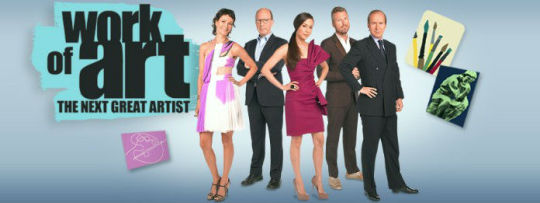
While the Bravo series only lasted two seasons before its 2011 cancellation, Work of Art: The Next Great Artist is a cultural treasure trove. The show was years ahead of its time—Despite premiering after (and being outshadowed by) big-name reality TV shows like Project Runway and America’s Next Top Model, Work of Art perfectly encapsulated and satirized reality TV and the fine art world while effectually becoming a work of art in itself: A concept so high it wasn’t even recognized or appreciated in its day.
Each season, fourteen contemporary artists competed through bizarre high-stakes challenges for the chance to win a solo exhibition at the Brooklyn Museum and a cash prize of $100,000. The series, which was produced by Sarah Jessica Parker, was backed by a cast of celebrity judges: actress and model China Chow, mega-famous art critic Jerry Saltz, and gallery owner Bill Powers; joined by Simon de Pury, famed Sotheby’s auctioneer who served as the quirky workroom mentor.
It’s obvious the show was much more “Next Great Artist” than “Work of Art.” As in, the art wasn’t great, but the contestants were. While a few provocative pieces were exhibited, most of the work was just “eh,” obviously made to fit a prompt. But with glorious irony, the artists themselves emerged as far more captivating than any of the work they produced.
When the average person lashes out on reality TV, they’re often written off as an actor or attention-seeker. “There’s no way a person would really react this way!” we accuse. But when it’s artists who act larger than life, the bit becomes believable. Countless misconceptions define our image of what an artist is like: A genius, a recluse, a nonconformist. Modeled after personalities like Van Gogh, Kanye, and Poe, artists are stereotyped as quirky, tormented outliers, prone to extreme behaviors and bouts of unrestrainable creativity. We find it believable when artists act eccentrically: It’s part of their creative process.

Work of Art: The Next Great Artist is a striking parody of what we believe artists are. In Work of Art, the most absurd contestants emerge as fan-favorites: A pop artist who calls himself “The Sucklord”; a weirdo performance artist everyone suspects is full of shit; a traditional realist painter who can’t fathom conceptual art; a self-trained artist with a distain for The Academy™️; and (my favorite) an interdisciplinary virtuoso adamant the best ideas came in his sleep, prompting him to stage frequent naps during challenges while others worked around him.
Work of Art was not designed to reveal the most talented artist, rather, the most interesting characters. The show’s Renaissance man model is outdated; no artist today has to excel in every type of challenge—found-object sculpture, commercial commissions, book cover illustrations, self-portraits and more. Contestants have to race to grab the best materials, struggle through team challenges, and defend their work in front of judges—Environments designed to elevate stress and reveal contestants’ most extreme reactions to pressure.
Instead of capturing the actual lives and processes of up-and-coming artists, the show captured another aspect of an art world that’s looking more and more like reality TV every day: The high-drama celebrity antics. Today, the art world is all about celebrity and scandal: Who can get into the news for the most bizarre, showy stunt, and who can be the next to outshine him? Rinse and repeat. Most recently, it was Banksy’s painting shredding at auction, then Maurizio Cattelan’s banana at Art Basel, then the hungry banana-munching performance artist who followed him. Each story blew up larger than the last, extending its reach from just art world insiders to household name dinner table fodder, consequentially skyrocketing the artists’ reputations.
Status is now equated with shock value in the art world on a major scale. The same can be said of reality TV—The genre’s hall of fame is made up of its loudest characters, with big personalities viewers love to latch onto and tear apart. Knowing this, contestants now go on shows with the sole intention of seeking attention, building a platform, and launching a career as an influencer or public figure. But due to the flood of reality TV stars, truly standing out is a skilled craft requiring strategy, complex character building, undetectable acting skills, and business savvy. Succeeding in today’s crowded reality TV influencer market is a form of art.

I propose Work of Art: The Next Great Artist was actually a work of conceptual art all along, and that its cast and crew designed the show with a nuanced understanding of contemporary culture.
While it may come off as fluff, Work of Art is actually a striking, poignant text about the relationship between art, reality TV, and celebrity antics (Spoiler alert: They’re all one and the same). Each artist used television as a medium to promote the self as an idea, as a product for consumption—A practice now commonplace in the contemporary art world. They adopted extreme personalities in hopes to outshine eachother with absurd stunts. And in doing so, they created a work of art that was equally emotionally moving and amusing, as all great works of art should be. The show epitomized what reality TV does best and what the art world does best—all the way back in 2010 when nobody could surely predict the trajectory of either medium.
Reality TV is, and always has been, performance art. But the cast of Work of Art took this to the next level, pushing the bounds of character acting while parodying the very medium they were working in. Despite this, the show was never taken seriously (Surprise surprise, reality TV being written off as frivolous!). I don’t take this as a failing on the show’s design, rather, it’s the kind of meta artwork that’s best appreciated in retrospect.
Today, as outrageous artist-celebrities and reality TV personalities have both exploded out of control, Work of Art: The Next Great Artist is all the more hilarious—A lighthearted parody of what could be (and what did become).
4 notes
·
View notes
Text
Perfume Week Day 7: The Soft Lawn
Imaginary Authors is a unique parfumerie whose fragrances are inspired by make-believe novels. Each of their fifteen perfumes is accompanied by its own story, complete with back-cover blurb, author, and even a specially-designed bookmark—A truly holistic approach to fragrance. With niche notes like fresh tennis ball and asphalt, their blends stand out as artisanal and conceptual works of wearable art.
Over the next week, I’ll be doing daily reviews of seven Imaginary Authors perfumes, each paired with its own playlist inspired by its scent and story—The only response I could see fit for a perfume line with such layered, multi-sensory consideration of what fragrance can achieve. Happy #perfumeweek <3

The Soft Lawn is the most graceful spring green: New England ivy-covered brick; warm breeze rustling through manicured trees; tea party picnics on the grass; linen sundresses with ruffles.
The refined blend of oakmoss, laurel, and ivy leaf is sophisticated, but never old. Balanced by linden blossom and fresh tennis ball, The Soft Lawn is bright, alive, and absolutely full of joy. It’s like the respite of the first day of spring, the head-rush of a cartwheel, a burst of serotonin.
As The Soft Lawn settles into the skin, its cheerful citrus mellows to reveal vetiver and clay court—earthy notes that ground the otherwise airy perfume. Its subtle scent comes in hints and brushes: Soft, but unwaveringly optimistic.
The Soft Lawn is the perfect pick me up to help get you through the day, bringing a burst of positivity with each encounter. Douse yourself when you’re in need of a breath of fresh air, greener pastures—A softer lawn to lay in.
The Soft Lawn - The Playlist
Ravyn Lenae - Right of Spring
Alt-J - Breezeblocks
The Friends of Distinction -Grazing In the Grass
Mariah Carey - Fantasy
Ariana Grande: God is a Woman
Xcape - Softest Place On Earth
Dizzy - Sunflower
October Tooth - Tennis Match
Dodie - She
#perfumeweek#perfume week#perfume#cologne#perfume review#fragrance#Imaginary Authors#ravyn lenae#alt j#friends of distinction#mariah carey#ariana grande#xcape#dizzy#october tooth#dodie#blogs#playlist#blog
3 notes
·
View notes
Text
Perfume Week Day 6: The Cobra & The Canary
Imaginary Authors is a unique parfumerie whose fragrances are inspired by make-believe novels. Each of their fifteen perfumes is accompanied by its own story, complete with back-cover blurb, author, and even a specially-designed bookmark—A truly holistic approach to fragrance. With niche notes like fresh tennis ball and asphalt, their blends stand out as artisanal and conceptual works of wearable art.
Over the next week, I’ll be doing daily reviews of seven Imaginary Authors perfumes, each paired with its own playlist inspired by its scent and story—The only response I could see fit for a perfume line with such layered, multi-sensory consideration of what fragrance can achieve. Happy #perfumeweek <3
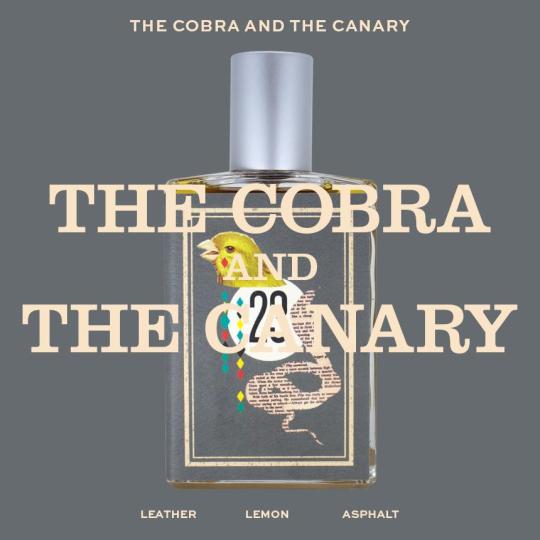
The Cobra & The Canary smells like the chase—Like meeting eyes with a leather-clad Casanova across the bar, like aftershave, like speeding off in his ‘64 convertible, top down. With strong notes of leather, lemon, and tobacco flower, The Cobra & The Canary is undeniably mysterious, magnetic.
The cologne was inspired by hot, hazy weekends, by country rides in vintage cars, pausing at seedy motels with cool swimming pools and hot debutantes, pouring cocktails and cigarette smoke.
At first the cologne comes off cool, nonchalant. But as the night winds down, The Cobra & The Canary begins to reveal its true colors: Softer, more delicate and mature. Sensitive notes of hay field and orris emerge, as the aroma becomes floral, woody, sun-baked.
The Cobra & The Canary is an edgy scent that comes off strong before opening up and showing its vulnerable side. It’s the kind of cologne that’ll have you saying, “He’s not like other guys—He’s sensitive.” And meaning it.
The Cobra & The Canary: The Playlist
Carrie Underwood - Cowboy Casanova
Paula Abdul - Cold Hearted
Nelly Furtado - Maneater
Boney M. - Daddy Cool
ABBA - Gimme! Gimme! Gimme! (A Man After Midnight)
Kesha - Your Love Is My Drug
Beyoncé, JAY-Z - Drunk In Love
Carly Pearce - Hide The Wine
Taylor Swift - Our Song
Sam Cook - Body Like A Back Road
#perfumeweek#perfume week#perfume review#perfume#cologne#imaginary authors#review#carrie underwood#paula abdul#nelly furtado#boney m#abba#kesha#beyonce#jay z#carly pearce#taylor swift#blog#blogs#playlist
4 notes
·
View notes
Text
Perfume Week Day 5: Sundrunk
Imaginary Authors is a unique parfumerie whose fragrances are inspired by make-believe novels. Each of their fifteen perfumes is accompanied by its own story, complete with back-cover blurb, author, and even a specially-designed bookmark—A truly holistic approach to fragrance. With niche notes like fresh tennis ball and asphalt, their blends stand out as artisanal and conceptual works of wearable art.
Over the next week, I’ll be doing daily reviews of seven Imaginary Authors perfumes, each paired with its own playlist inspired by its scent and story—The only response I could see fit for a perfume with such layered, multi-sensory consideration of what fragrance can achieve. Happy #perfumeweek <3
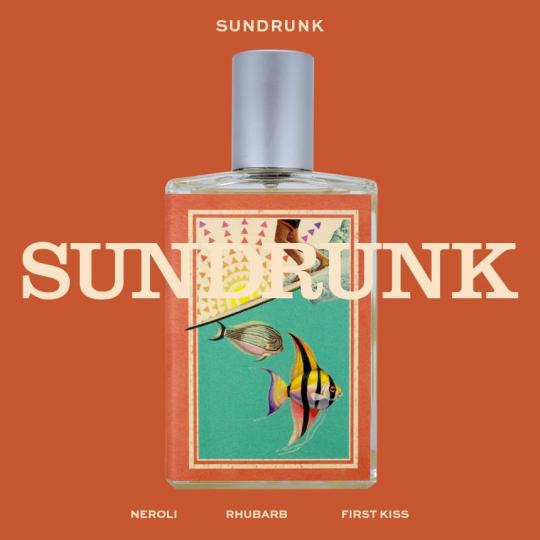
Sundrunk is the bright POP! of orange soda—An effervescent citrus bomb. Dominated by a strong top note of orange zest, Sundrunk calls to mind frozen fruit pops and hot summer days.
But quickly, the scent transforms from playful to rather sophisticated, revealing a base of neroli, rhubarb, honeysuckle, and rosewater—notes far more nuanced than typical citrusy blends. As it settles, Sundrunk smells of the most refreshing summer afternoon: Hanging your laundry to dry under lemon trees, sipping on iced tea, picking herbs from your backyard garden, inhaling their green cologne.
The perfume was inspired by a novel about relentless optimism, about drive, about “walking towards the warmth.” Protagonist Clementine Cope left her Montana home on foot, journeying thousands of miles through the snow, walking in the direction of the sun each day until landing upon the California coast, guided merely by light.
Sundrunk is that light.
Sundrunk: The Playlist
LEN - Steal My Sunshine
Aaron Carter, No Secrets - Stride
Selena Gomez - Dance Again
B*Witched - Freak Out
Gwen Stefani, Johnny Vulture - Bubble Pop Electric
Lizzo - Juice
Fergie - Clumsy
The Wiggles - Fruit Salad
Miley Cyrus - Slide Away
Vanessa Carlton - A Thousand Miles
#perfumeweek#perfume week#perfume review#cologne#perfume#review#imaginary authors#fruit#LEN#Aaron Carter#Selena Gomez#B*Witched#Gwen Stefani#Lizzo#Fergie#The Wiggles#Miley Cyrus#Vanessa Carlton#blog#blogs#playlist
1 note
·
View note
Text
Perfume Week Day 4: Every Storm A Serenade
Imaginary Authors is a unique parfumerie whose fragrances are inspired by make-believe novels. Each of their fifteen perfumes is accompanied by its own story, complete with back-cove blurb, author, and even a specially-designed bookmark—A truly holistic approach to fragrance. With niche notes like fresh tennis ball and asphalt, Imaginary Authors blends stand out as artisanal and conceptual works of wearable art.
Over the next week, I’ll be doing daily reviews of seven Imaginary Authors perfumes, each paired with its own playlist inspired by its scent and story—The only response I could see fit for a perfume line with such layered, multi-sensory consideration of what fragrance can achieve. Happy #perfumeweek <3
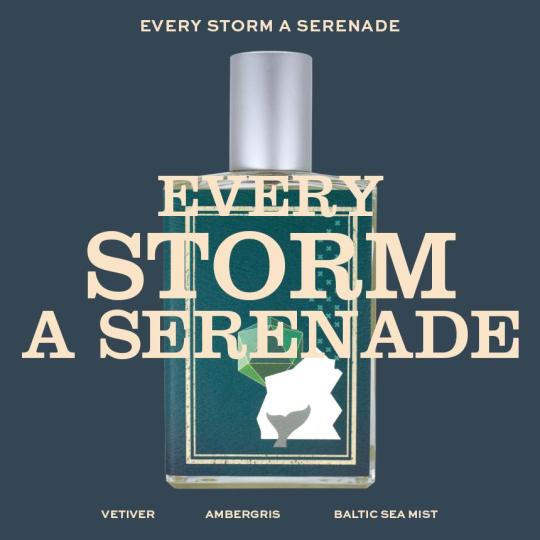
Every Storm A Serenade is a perfume with two lives.
At first spray, the ambergris-spruce-eucalyptus blend is bright enough to stun. The scent is fantastically manic. It sizzles and swirls, like currents, like electricity, like stormy seas. Every Storm A Serenade wakes, jolts, revives.
But in time, the perfume’s zippiness mellows, giving way to hints of vetiver and breezy calone. While still bright and crisp, Every Storm A Serenade becomes more resolved, stiller: A hovering cloud of sea mist rather than tempestuous ocean waves. Even so, the medley is decidedly high-strung, wonderfully intense.
Every Storm A Serenade was inspired by “the spiraling psyche of lust and longing.” Following a whirlwind romance borne one fated night with a Danish fisherman, obsessed novelist Stina begins to write hundreds of letters, never to be sent, chronicling her devotion to a man she may never see again.
Wearers of this fragrance may experience upticks in energy, or sensations of buzzing in the nose and in the heart. Stop wearing Every Storm A Serenade if you experience sudden, insatiable yearning for seafaring Danes.
Every Storm A Serenade: The Playlist
Nina Hagen - Future Is Now
Lady Gaga - ScheiBe
Darude - Sandstorm
AWOLNATION - Sail
BORNS - Electric Love
Lizzy Mercier Descloux - I’m Liquor
High Frequency Vibration
#perfumeweek#perfume week#perfume#cologne#perfume review#review#fragrance#imaginary authors#nina hagen#lady gaga#darude#awolnation#borns#lizzy mercier descloux#meditation music#blog#blogs#playlist
3 notes
·
View notes
Text
Perfume Week Day 3: Cape Heartache
Imaginary Authors is a unique parfumerie whose fragrances are inspired by make-believe novels. Each of their fifteen perfumes is accompanied by its own story, complete with back-cover blurb, author, and even a specially-designed bookmark—A truly holistic approach to fragrance. With niche notes like fresh tennis ball and asphalt, their blends stand out as artisanal and conceptual works of wearable art.
Over the next week, I’ll be doing daily reviews of seven Imaginary Authors perfumes, each paired with its own playlist inspired by its scent and story—The only response I could see fit for a perfume line with such layered, multi-sensory consideration of what fragrance can achieve. Happy #perfumeweek <3

Imagine standing at the top of a mountain, 3,000 feet in the sky, surrounded by tall trees and fresh untainted air, fruit sprouting in bushes near the summit.
Such is the experience of wearing Cape Heartache, an irresistible blend of Douglas Fir, pine resin, vanilla, and strawberry, inspired by imaginary author Philip Sava’s fictional travel-romance novel detailing his 1881 expedition to the Pacific Northwest.
Cape Heartache smells like nostalgia you can’t quite put your finger on: Winter holidays, flannels, warm spiced berries, and a specific yet unplaceable aroma of fresh wood—like shavings from pencils in a childhood classroom, or perhaps sticks gathered and whittled for roasting marshmallows?
Cape Heartache is a clarifying cologne with a surprising sweetness. The syrupy scent of strawberry carries the perfume’s woodier notes, giving Cape Heartache a layer of femininity rare to outdoorsy fragrances. The truly universal, unisex blend has the power to warm vanilla-wearers to resinous foresty fragrances and push devoted cologne-heads to introduce a bit of sweetness to their lives.
Two things that shouldn’t work together—cloying berry and dry wood—combine in perfect complement in the rule-breaking fragrance of Cape Heartache, encouraging all to take note and go against the grain.
Cape Heartache: The Playlist
The Police - Every Breath You Take
Anderson .Paak - The Bird
Duran Duran - Hungry Like The Wolf
Starship - Nothing’s Gonna Stop Us Now
Harry Styles - Watermelon Sugar
Jesse Boykins III - Earth Girls
Lorde - Homemade Dynamite
Mitski - Real Men
#perfumeweek#perfume week#perfume#cologne#perfume review#review#lorde#mitski#jesse boykins#harry styles#starship#duran duran#anderson paak#the police#blog#blogs#playlist
3 notes
·
View notes